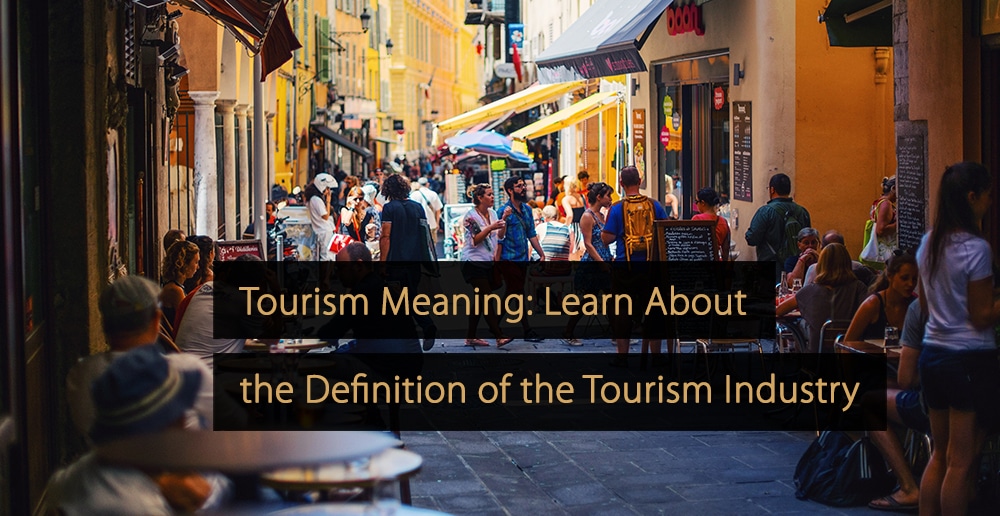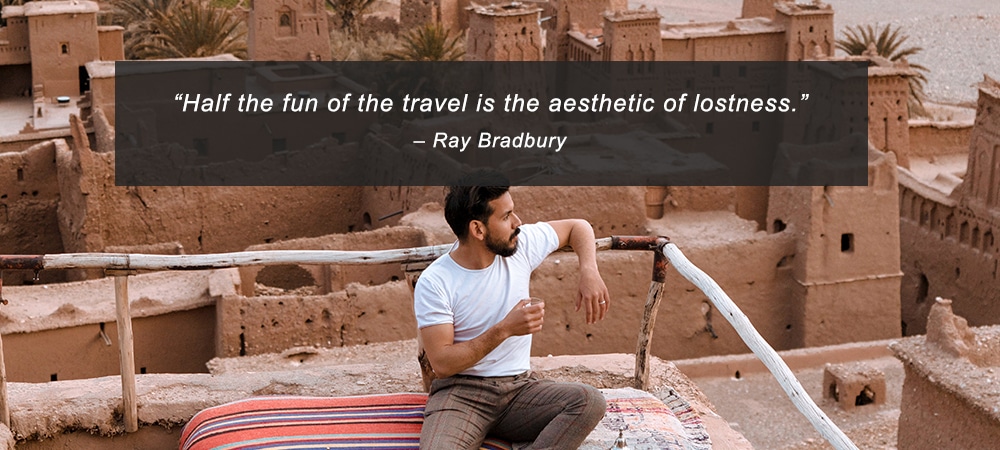For those working in the industry, having a tourism meaning or definition at hand can be invaluable because it helps to reinforce the purpose of providing a great tourism experience. In this article, you can explore the meaning of tourism as a whole, the meaning of different forms, and the pros and cons of tourism as a concept.
Table of Contents:
- Tourism Meaning
- A Brief History of Tourism
- Definition of Tourism vs. Definition of Travel
- What is the Meaning of Different Tourism Forms?
- Categories & Types of Tourism
- Benefits of Tourism
- Disadvantages of Tourism
- Tourism Technology and Its Meaning to Tourism Innovation
- Meaning of Tourism Management in the Industry
- Travel and Tourism Meaning and Activities
- Understanding the Meaning of Tourism Marketing Strategies
Tourism Meaning
The first step to understanding the meaning of tourism is to equip yourself with a clear tourism definition. The United Nations World Tourism Organization (UNWTO) defines tourism as people “traveling to and staying in places outside their usual environment” for leisure, business, or other purposes. For travel to qualify as tourism under this definition, it must last more than 24 hours and not last more than one year. Tourism Industry plays a big part in global economy. According to the World Travel & Tourism Coucil Economic Impact Report, in 2022, the Travel & Tourism sector contributed 7.6% to global GDP.
Moreover, tourism can be divided into domestic tourism, which occurs within one country, or international tourism, where a person travels outside their country. Tourism is a major contributor to many countries’ economies, and popular tourist destinations will often include a wide range of businesses specifically designed to cater to travelers from other locations.
A Brief History of Tourism
The concept of traveling to other locations for pleasure existed in Ancient Egyptian, Greek, and Roman civilizations, meaning tourism, as a concept, has existed for thousands of years. Of course, in early times, travel primarily occurred on horseback or using boats, which meant long-distance travel was difficult.
Initially, tourism was also a pursuit for the most wealthy and powerful in society. This gradually started to change as the centuries passed. However, modern tourism is often traced back to the Industrial Revolution, with British society being among the first to embrace the idea of ordinary people traveling for leisure.
Today, the concept of tourism is firmly established within many cultures. It is common for countries to promote this idea, with tourism meaning more visitors and money spent on local businesses.
Definition of Tourism vs. Definition of Travel
Once equipped with a basic tourism meaning, it can be essential to establish precisely how the concept differs from travel. Travel is a broader term describing people’s movement from one point to another. Travel can occur for various reasons, and travel can occur between any two points.
Tourism is a form of travel, and it is fair to say that all tourists are also travelers. However, tourism only occurs for specific purposes, such as leisure or business, and must meet previously explained criteria. Therefore, it is possible to travel between locations and fail to meet the criteria where you would be considered a tourist.
The travel and tourism industries are closely connected, and both are usually considered to include accommodation, transportation, and similar services. However, the travel industry has a broader focus. It may include various services that help people move between two locations not connected to the tourism concept.
Video: Components Of Tourism
What Is the Meaning of Different Tourism Forms?
Tourism can take several forms, and the most significant examples are outlined below, allowing you to build a deeper understanding of the overall tourism meaning.
Domestic Tourism Meaning
Domestic tourism refers to a person traveling for leisure or business purposes within their home country. However, the precise definition goes beyond this, with domestic tourism meaning that a person travels from where they usually reside and then stays in their new location for at least one night.
Large countries, such as the United States and China, will attract a lot of domestic tourism, primarily because of their size. This means traveling within the same country can encounter vastly different climates, cultures, and experiences. However, most countries will generate domestic tourism, as traveling within one country is often more affordable than traveling internationally.
The projections of domestic tourism for 2032 by Domestic Tourism Market Size, Share Global Analysis Report by Polaris Market Research, is to grow to $7,970.78 billion.
Inbound Tourism Meaning
The meaning of inbound tourism can be best explained from the perspective of a single country. When a country receives tourists from other nations, these tourists are referred to as inbound tourists. Again, to qualify as inbound tourism, this travel must last for at least one overnight stay and not exceed one year.
Inbound tourism is a major contributor to many economies worldwide, and some nations rely on significant inbound tourism. However, for many countries, inbound tourism is also seasonal. For instance, many countries experience an increase in inbound tourism in the warmer summer months or around major events.
Outbound Tourism Meaning
An outbound tourism meaning can be best obtained by comparing the concept to inbound tourism. Again, from the perspective of a single country, outbound tourism refers to tourism that takes people out to another country.
Countries can still make money from outbound tourists because they may purchase travel products and services from a local travel agent and may spend money on transport tickets. It is important to understand that a single traveler leaving their country will be both an inbound and an outbound tourist because they will be leaving one country and entering another. In this sense, the two concepts are heavily reliant on perspective.
Categories & Types of Tourism
Benefits of Tourism
As a concept, tourism has the potential to deliver significant benefits. In this section, we discuss the positive tourism meaning. These positive consequences of tourist activity can be broadly divided into two main categories, as outlined below:
Economic and Infrastructural Benefits
First, it is crucial to understand that tourism can deliver significant economic and infrastructural benefits for the country receiving guests. Tourists will likely spend money in the local area, including shopping, paying for accommodation, visiting bars and restaurants, attending visitor attractions, and buying souvenirs.
Meanwhile, the presence of tourists can also produce benefits in terms of local infrastructure. Transport links are likely to improve to accommodate these visitors, new hotels are likely to be built, road systems may be improved to deal with the additional traffic, and all of this can provide jobs for residents.
Social and Cultural Benefits
Aside from the economic and infrastructural benefits associated with tourism, it is also worth highlighting that tourism can deliver social and cultural positives. For instance, bringing people from different cultures into contact with one another can help to expand cultural awareness and improve social cohesion.
The influx of tourists to a location can help to provide clear reasoning for investing in the upkeep of sites of cultural value. Moreover, this investment in the local area can potentially help to preserve historic buildings, maintain areas of natural beauty, and lead to the general upkeep of urban and rural environments.
Disadvantages of Tourism
While plus points should be highlighted, there are potential downsides, with increased tourism meaning significant changes for residents. Some of the most significant disadvantages are outlined below:
Environmental Disadvantages
Although tourism has the potential to incentivize environmental upkeep, it is worth highlighting that there are environmental issues, too. By definition, tourism will increase the number of people in a specific area, which means that natural resources will be stretched further, including water.
The increase in vehicles can lead to pollution. In contrast, prioritizing attractions for visitors can destroy natural areas and lose natural animal habitats. Disruption to the area can also potentially lead to significant changes in migration patterns, meaning local wildlife may disappear.
Social and Cultural Disadvantages
While tourism has the potential to enhance and preserve aspects of local culture, it can also do the opposite, with tourism meaning the eradication of local culture and the adoption of cultural aspects from visitors. This can be especially problematic for locations attracting many tourists from one country.
Unfortunately, some tourists will lack interest in local culture and traditions and seek familiar businesses and attractions. This can create demand for foreign businesses and attractions, which may displace local ones. In the worst cases, it can eradicate some local ways of life.
Economic Disadvantages
It is easy to over-simplify the economic effects of tourism, with tourism meaning more jobs and more people spending money in the local economy. However, many of these jobs are seasonal or otherwise unstable. Meanwhile, many jobs are considered low-skilled and usually offer low pay rates.
Some locations become overly reliant on tourism at the expense of other aspects of their economy. This can lead to a lack of diversity in terms of available jobs. In the worst situations, it can also mean that people who do not choose to live in a central tourist area face the prospect of being left behind while others prosper.
Tourism Technology and Its Meaning to Tourism Innovation
Tourism technology can drive innovation in the local area. Companies that embrace the latest tourism trends are more likely to provide the kind of high-quality tourist experience that customers want. In truth, almost any technology used within tourist-centered businesses or to assist tourists can be regarded as tourism technology. Within the hotel industry, for example, technology is often used to make processes more manageable for the staff or to improve the experience for hotel guests.
Technology has also been implemented in ways that make tourism easier to achieve. Mobile apps have made booking travel or hotel rooms quicker and easier. In contrast, various computer software, robotics, and artificial intelligence innovations have helped businesses increase productivity and improve business strategies. The software has also made it easier to process large amounts of data and draw valuable insights. This can identify emerging travel and hospitality trends or optimize distribution strategies to maximize revenue.
Meaning of Tourism Management in the Industry
The meaning of tourism management is difficult to distill into a short sentence because it is a broad area encompassing all managerial positions within the hotel industry, the travel industry, and even parts of the food industry, including restaurants, bars, and cafes.
For those working in these fields, management responsibilities will likely include keeping up with the latest travel, hospitality, and hotel trends, overseeing core operations, maintaining a positive business reputation, managing customer relationships, and overseeing admin and business strategies, including marketing.
In addition, tourism management is a discipline that is concerned with managing tourist activity. This could involve, for instance, working for a tourism agency or association, providing tourist information, and taking strategic steps to help a location cope with the demands and stresses of accommodating large numbers of visitors.
Travel and Tourism Meaning and Activities
A detailed tourism meaning or definition will also provide an overview of the different sectors and companies that make up the industry, an explanation of the various career opportunities provided by the industry, and an exploration of some related areas, such as travel agencies and tourism courses.
In the article “Travel and Tourism Industry; A Complete Overview of All Activities,” you will find a breakdown of the transportation, accommodation, food, beverages, and other components that make up the industry, along with details on related activities, career paths, educational opportunities, and much more.
Understanding the Meaning of Tourism Marketing Strategies
Marketing is a vital consideration for businesses working in the tourism industry. Effective tourism marketing means businesses appeal to customers’ wants, needs, and expectations and provide incentives to make bookings or purchases. For instance, voice search is an increasingly important consideration, while chatbots can help provide swift answers to the more fundamental questions that potential customers may ask.
In the article “Tourism Marketing: Brand New Marketing Tips to Boost Your Results”, you can read about some of the main tips that will assist businesses in reaching out to customers and generating more bookings.
Tourism Meaning FAQs
Tourism meaning can be briefly summarised as traveling away from home to another place and staying for at least 24 hours, but not for more than one year. Tourism can take different forms, such as domestic and international tourism, and it can have pros and cons for regions that attract large numbers of visitors.
Did You Like This Article About Tourism Meaning?
You might also be interested in the following articles:
- Sustainable Tourism Guide: What is, Why Important, Examples and More…
- Tourism Startups Focus on Innovation and Sustainability
- Travel Business Opportunities: Become a Part of the Travel Industry!
- Tour Companies: Benefits of Partnering for Hoteliers
- Travel Meaning: What You Need to Know About the Travel Industry
More Tips to Grow Your Business
Revfine.com is the leading knowledge platform for the hospitality and travel industry. Professionals use our insights, strategies, and actionable tips to get inspired, optimize revenue, innovate processes, and improve customer experience.Explore expert advice on management, marketing, revenue management, operations, software, and technology in our dedicated Hotel, Hospitality, and Travel & Tourism categories.
This article is written by:
Hi, I am Martijn Barten, founder of Revfine.com. With 20 years of experience in the hospitality industry, I specialize in optimizing revenue by combining revenue management with marketing strategies. I have successfully developed, implemented, and managed revenue management and marketing strategies for individual properties and multi-property portfolios.












Thank you for defining tourism clearly; well done.
I have a question, when was this article published? I need it for correct citation :)
The Revfine.com team has written the article. This article is updated on a regular base.